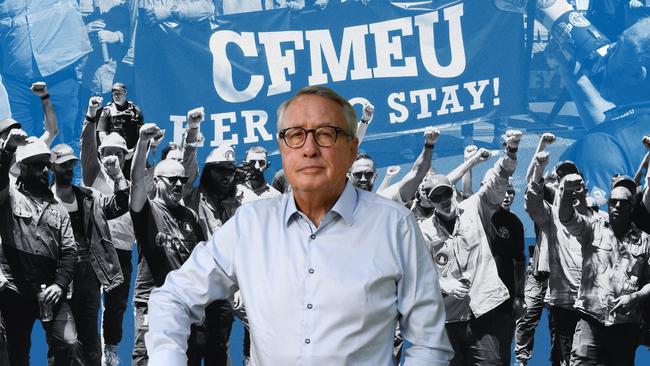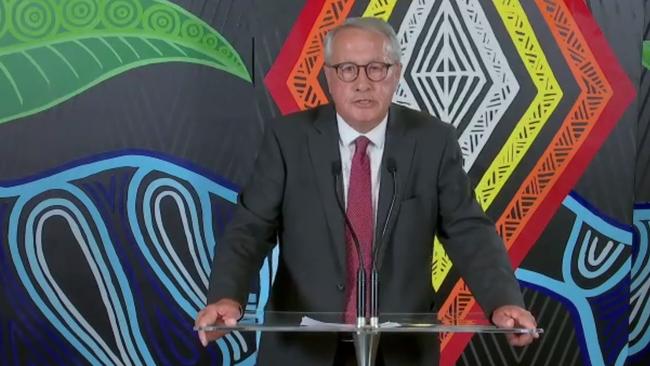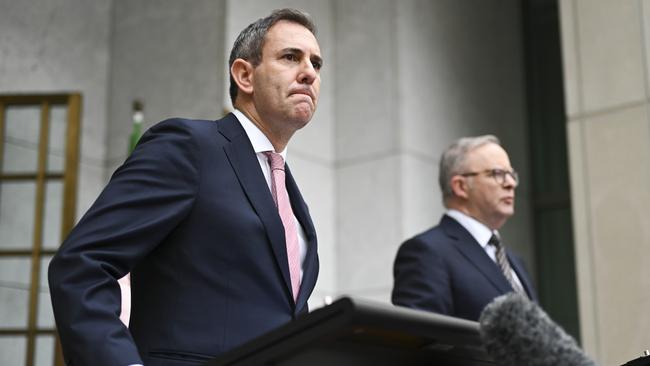Cashed-up Labor refuses to stand up to CFMEU and Cbus


And 2024 has been no exception in this regard. In Australia, we have witnessed the exposure of the egregious behaviour of the Construction, Forestry and Maritime Union, ranging from the unacceptable to the criminal. The dubious conduct of some of the industry super funds has also been revealed, calling into question a model that has served the interests of both the union movement and the Labor Party very well.
Take the actions of the CFMEU, which have massively driven up construction costs and caused inordinate delays to the completion of projects. Let’s face it, everyone, including everyone in the Labor Party, has known about the misconduct for years, even though some of the details were slightly hidden, including the involvement of criminal bikie gangs.
CFMEU officials have been able to bully head building contractors to sign exclusive agreements, the generous terms of which then flow on to all other workers on a site lest subcontractors be excluded from obtaining any work. You might ask why those head contractors don’t stand up to this tactic. The reality is that the costs of doing so are very high and there is nothing for them in protecting subbies, even though this would be the ethical thing to do. Union membership is effectively compulsory for all workers.

The relative lack of competition in the large-scale construction sector is another contributing factor. And state Labor governments have also gone along with CFMEU-dictated conditions even if they are costly for taxpayers. Witness the statewide imposition of Best Practice Industry Conditions by the Miles Labor government in Queensland, which outlined a set of excessive pay and conditions.
From the point of construction workers, there are real benefits, with above-market pay and conditions on offer. This leads to a loyal and compliant cohort of members.
In turn, the Fair Work Commission has had no problem certifying the CFMEU agreements. It’s all part of the industrial relations club – the unions, the employers and the institutions are all part of it. It’s just the poor taxpayer and consumers who come off badly.
These agreements typically specify that monies must be paid into a nominated redundancy fund to cover the costs of employment intermittency for workers in the industry. In the case of Victoria, this fund is Incolink, which is governed by representatives of unions and employer associations. Over time, the funds under management have grown exponentially as more bits and pieces have been added to the compulsory payments made by employers. The fund is essentially unregulated.
It has now emerged that the surplus funds are handed over to the unions and the key employer association, the Master Builders Association of Victoria, rather than being directed back to the worker members. It is only too apparent that the MBAV would be essentially broke were it not for the flow of funds from Incolink. The suggestion is that there are strong incentives for the MBAV to broker CFMEU-certified agreements because of this out-of-sight arrangement. It’s another example of the IR club in action.
Why would the Labor Party, at both federal and state level, not act on the widely known abuse of power by CFMEU officials? The answer is money and power.
The Labor Party has received many million of dollars in donations from the union over the years. The union also has been able to influence the preselection of members for parliament because of the number of delegates it commands. The union effectively “owns” some members of parliament.
The belated decision of the federal Labor government to appoint an administrator to run the CFMEU, at least for a while, was taken reluctantly. Whether this arrangement has any sustainable impact on the way the construction industry operates is unclear. Some officials have lost their jobs, although others have retained theirs. Direct donations from the union have largely ceased at this point.
This year also saw the issue of the governance of industry super funds come into focus with revelations about the shabby treatment of some Cbus members. Cbus is the large industry fund covering the construction industry.
It turned out that there were inordinate delays in processing a substantial number of claims for death and disability payments. The trustees of the fund, headed by former Labor treasurer, Wayne Swan, blamed the outsourced agency; the agency maintained it had done nothing wrong.
There was also the fallout from the CFMEU being put into administration and the fate of the CFMEU-nominated trustees on the Cbus board. In the first instance, the three trustees were removed. One replacement is a former union official who had been a trustee of another super fund that had performed so badly it had to be absorbed into another, larger fund. One of the original trustees was also reinstated.
Finally, the Australian Prudential Regulation Agency sprung into action and started asking questions about the flow of funds from Cbus (and other industry super funds) to affiliated unions. Swan declared that Cbus had received “good value” from a payment to the CFMEU of nearly $1m, although he was unable to specify what was actually achieved. Over the years, the CFMEU, other unions and the sponsoring employer associations have received millions of dollars from the superannuation fund.

The Deloitte report into the governance of Cbus has not answered the key questions, including in relation to payments for unknown outcomes and the inadequate process for selecting directors. Bizarrely, the report concludes that all the trustees, including the newly nominated ones, meet the definition of “fit and proper”, a conclusion that Cbus and apologists for the equal representation model of industry super funds have now leapt on.
The reality is that industry super has provided a lifeline for the beleaguered trade union movement, including as a source of plentiful funds to channel back to unions and indirectly to the Labor Party. Trustee fees are regularly redirected back to the sponsoring unions, thereby covering, at least partly, the relevant official’s remuneration package.
The blatant flouting by industry funds of the single purpose test to act in the best financial interests of members has simply been overlooked by the key regulatory authority, APRA, at least until very recently. The value of the millions of dollars paid in sponsorships to sporting clubs and other causes has gone largely unquestioned.
So, yes, following the money is a useful guide to understanding what is going on in the public square. The revelations about the CFMEU and Cbus are really the tip of the iceberg. But bear in mind, it takes two to tango in this game – donor and recipient, perpetrator and facilitator.
If employers and employer associations showed more courage – and we should acknowledge that this can be difficult – things might be different. But no one should be holding their breath that much will change in 2025.





One of my pals regularly reminds me to follow the money to understand public events. What may seem incomprehensible, even irrational, suddenly makes sense when the flows of money, both from donors and to recipients, are considered. Throw in power and the full explanations are there in full sight.